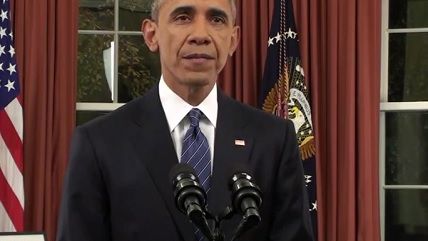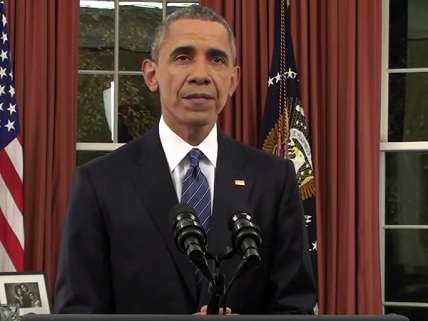Obama's Foreign Policy Legacy an Embrace of Intervention and Unilateralism
It's been a parade of aimless interventions and broken promises


President Obama entered office eight years ago on a wave of optimism that he was heralding substantive change, even if it was ill-defined on the campaign trail. On the foreign policy front, that meant ending the Iraq war, refocusing on the war in Afghanistan, and being willing to engage with America's enemies.
Next week, Obama leaves office with the United States military engaged in operations to varying degrees of intensity in more than half a dozen countries against a number of radical Islamist terrorist organizations like Al-Qaeda, ISIS, and their various affiliates, plus Joseph Kony's Lord's Resistance Army in Uganda, where the U.S. has provided crucial backing to the authoritarian regime of Yoweri Museveni.
Some of the interventions Obama is bequeathing his successor were ones he himself inherited. The Afghanistan war has now gone on for longer than the American Civil War, World War I, and World War II combined. President Obama ordered a troop surge in Afghanistan in 2009—a concomitant "surge" of diplomatic personnel was supposed to accelerate the end of the war. Instead, any opportunity to take advantage of the surge to end the war was wasted by bureaucratic infighting and inertia. The withdrawal date for U.S. troops in Afghanistan was regularly delayed, and is now set for later this year, after President Obama leaves office. U.S. troops are fighting not just the Taliban, the Al-Qaeda ally that drew the U.S. into Afghanistan after 9/11, but also the Islamic State in Iraq and Syria (ISIS), which has recently been operating in Afghanistan. Ending the war in Afghanistan will be up to Obama's successor.
President Obama did preside over the end of the Iraq war, and in the 2012 election he took credit for ending it as part of his campaign, even though the war ended based on a status of forces agreement negotiated by the Bush administration. President Obama tried to delay that negotiated end by keeping U.S. forces in Iraq past the withdrawal date. In 2014, U.S. troops began to return to Iraq as part of the campaign against ISIS. That campaign also finally opened the door for the Obama administration to send the U.S. military into Syria, after a previous effort motivated by the Assad regime's purported use of chemical weapons against civilians failed. Opponents of ending the war in Iraq pointed to the return of U.S. troops as vindicating their position, since they had argued a U.S. withdrawal would destabilize Iraq. That was very much a self-fulfilling prophecy. The U.S. invasion of Iraq destabilized the country, while the extended occupation enfeebled the post-Hussein government, fostering in it a dependence on foreign support.
Other disasters are entirely of the Obama administration's making. The 2011 U.S. intervention in Libya was heralded as a different kind of intervention than the invasion of Iraq, because it was supported by the Arab League, did not involve a significant number of U.S. troops on the ground, and did not lead to an extended occupation. Many of the effects, however, were similar. The intervention destabilized Libya. Weapons from the former Qaddafi regime were spread far and wide, from Nigeria to Syria, aggravating conflicts across North Africa and the Middle East. Mali, which the U.S. had a few years earlier identified as one of Africa's "most enlightened democracies," suffered a coup and was beset by Islamist militants from Libya, bringing it to the verge of collapse. The U.S. intervention in Libya also contributed to the refugee crisis with which European countries are now dealing. U.S. special forces are in Libya fighting against ISIS, which, along with Al-Qaeda and other smaller terrorist groups, did not exist in Libya prior to the intervention.
The Obama administration has also opened up fronts in the global war on terror (though they dropped the terminology) in West Africa, sending U.S. troops to aid local forces in the fight against Boko Haram, a militant Islamist group which has aligned itself with ISIS and Al-Qaeda. The U.S. is building a $100 million drone base in Niger. In East Africa, U.S. troops were first deployed toward the end of the Bush administration to aid in the hunt against Kony. The U.S. now also uses Uganda to stage incursions to battle Al-Shabaab, another African Islamist militant group that's aligned itself with both ISIS and Al-Qaeda, in Somalia, a country the U.S. has intervened in on-and-off since the elder Bush administration in 1991.
A few short years ago, President Obama pointed to U.S. involvement in Yemen, which consisted largely of drone strikes against alleged Al-Qaeda leaders and operatives, many of whom were identified by the authoritarian regime in Yemen, as a model of success in the war on terror. It was, according to the Obama, a limited intervention focused on taking out Al-Qaeda leadership that did not have broader side effects. The model fell apart when Yemen did. The drone campaign helped destabilize the country, leading to a coup by Houthi rebels and a two year long civil war in which U.S. ally Saudi Arabia has intervened. Saudi Arabia has used U.S. bombs in unlawful airstrikes and committing other alleged war crimes, often with U.S. weapons.
President Obama also insisted on an "Asia pivot" to go along with his purported disengagement from the Middle East (a disengagement that never really happened). That pivot, meant to strengthen U.S. relations with other Pacific countries not named China, contributed to China taking a more confrontational stance in the region. The Obama administration professed not to understand the provenance of this more confrontational posture by China. The Asia pivot was an unnecessary and counterproductive show of U.S. strength. Meant to contain China, it actually encouraged the country to be more aggressive. Tragically, it also closed the door on potential cooperation between the U.S. and China on issues like trade and terrorism. The Trans-Pacific Partnership, effectively nixed by President-Elect Donald Trump, notably did not include China, contributing to the sense that the U.S. was interested in containing a global power that had not articulated any national security agenda explicitly or implicitly opposed to the U.S.
At the same time, while President Obama points to the Iran nuclear deal as a prime example of his successes on the diplomatic foreign policy front, relations with Iran did not actually improve. The U.S. finds itself regularly "harassed" by Iranian forces in the Strait of Hormuz, an important passage in international trade. The deal itself, bypassing the Senate as it did, can be easily overturned after Obama leaves office. Any thaw in U.S.-Iranian relations looks increasingly illusory.
Relations with Russia, meanwhile, have significantly deteriorated. After the Russian invasion of Georgia in August 2008, Republican presidential nominee John McCain took a more strident posture toward Russia and Russian President Vladimir Putin than his opponent Barack Obama or even Republican President George W. Bush. In 2012, Mitt Romney warned that Russia was the U.S.'s number one geopolitical enemy. John Kerry, an Obama surrogate during the campaign, mocked Romney's position, calling it a "preposterous notion" and saying that Romney "talks like he's only seen Russia by watching Rocky IV." By 2014, Kerry, at that point already secretary of state, was using the Rocky IV line on Russia—telling the Russians not to treat the conflict in Ukraine as a Cold War confrontation. "We're hoping that Russia will not see this as a sort of a continuation of the Cold War, we don't see it that way," Kerry said on MSNBC at the time. "We do not believe this should be an East-West, Russia-United States—this is not 'Rocky IV.'" Russia's involvement in Ukraine led to limited sanctions by the U.S. and Europe, and President Obama announced the imposition of more sanctions last month.
Those sanctions came after the U.S. intelligence community accused Russia of trying to "interfere" in the U.S. presidential election and of being behind the hack of the Democratic National Committee that is believed to have led to a trove of emails pertinent to the election being disclosed by Wikileaks. Since the election, Democrats have increasingly adopted the idea that the U.S. and Russia may be in a new Cold War. Even before the election, Democratic presidential nominee Hillary Clinton was campaigning on a platform of taking a more confrontational stance against Russia. This week, the U.S. made its first deployment of troops in Poland.
The deterioration of relations with Russia are emblematic of the aimless and reactive yet also interventionist U.S. foreign policy advanced by the Obama administration. Secretary of State Hillary Clinton promised Russia a "reset" at the beginning of the Obama administration. Instead U.S.-Russia relations are at their lowest point since Russia was part of the Soviet Union. The Obama administration dropped the terminology of the "global war on terror," promising a more nuanced approach, yet the president leaves office with a war on terror at least as global as the one he inherited from Bush, and no less ad hoc. His first official act as president was to order the closure of Guantanamo Bay, but it will have remained open for the entirety of his eight years in office. Tragically, Obama, who had a background as a constitutional lawyer and who often spoke critically of a unilateral executive foreign policy and war-making, did not do anything to limit himself or future presidents or to roll back any of the powers that have amassed in the executive branch in regards to the prosecution of the foreign policy and the war on terror, leaving Donald Trump even more powers than he himself inherited from Bush.


Show Comments (72)